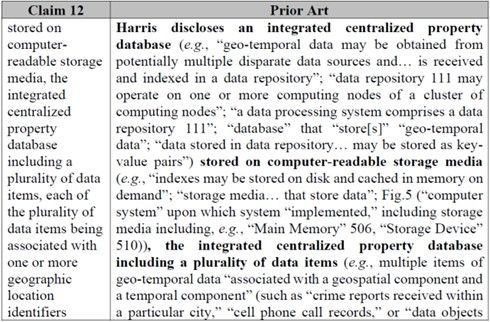- within Strategy topic(s)
On March 23, 2024, Nearmap US, Inc. ("Nearmap") filed a petition for inter partes review ("IPR") of U.S. Patent No. 10,671,648 ("the '648 Patent") ("IPR716"), assigned to Eagle View Technologies, Inc. ("Eagle View"). The '648 Patent relates to integrating information associated with particular geographic locations in a centralized database that may be queried for a time history of any of the locations. Nearmap asserted four grounds of unpatentability, consisting of an anticipation ground and three obviousness gounds. Each ground relied at least in part on U.S. Patent No. 9,501,507 to Harris et al. ("Harris").
In support of its unpatentability challenges, Nearmap constructed a single 64-page claim chart. The claim chart included a left column listing the specific claim language of each challenged claim, and a right column restating specific limitations from the claim language followed by parentheticals reciting portions of the asserted prior art that allegedly disclose the limitations. An illustrative example from the claim chart is reproduced below:

The claim chart also included citations to extensive portions of an expert witness declaration, numerous citations to Harris, and reproduced figures from Harris. Nearmap asserted that the petition "collects disclosures from the asserted references and provides a detailed, limitation-by-limitation chart expressly mapping each word of the [c]laims to the disclosures of each relied-upon reference, with statements in the text following each mapping describing the particular combinations and motivations to combine."
Eagle View, however, characterized the petition differently. Eagle View contended that the petition did not address any claim limitation with particularity. Further, it noted that "[t]he petition must include 'a detailed explanation of the significance of the evidence,' 37 C.F.R. § 42.22(a)(2), including 'where each element of the claim is found in the prior art patents or printed publications relied upon.'" Eagle View also asserted that Nearmap failed to provide any context for the cited portions of Harris but rather aggregated an "enormous list" of "every passage that may be vaguely connected with some aspect of the claim limitations." In sum, Eagle View contended that Nearmap did not provide the kind of detailed and developed petition required by law.
The PTAB agreed with Eagle View. Citing the Supreme Court, the PTAB noted that "the petitioner is master of its complaint," and is thus responsible for plainly challenging the disputed claims. The PTAB explained that it "is not the Board's responsibility to weave together [Nearmap's] evidence into a cohesive case." Moreover, the PTAB agreed with Eagle View that Nearmap's citation to the expert witness declaration was improper. The PTAB noted that such incorporation by reference of arguments is expressly prohibited by the patent rules. The PTAB thus found that Nearmap had "not shown by a reasonably likelihood that any of the challenged claims [were] unpatentable," and denied institution.
Takeaway
Petitioners should consider providing precise and definite arguments pertaining to each limitation of challenged claims. The PTAB may decline to read further into imprecise arguments.
The content of this article is intended to provide a general guide to the subject matter. Specialist advice should be sought about your specific circumstances.



